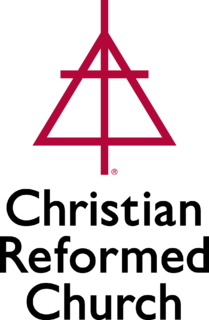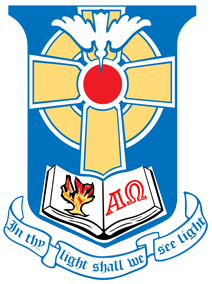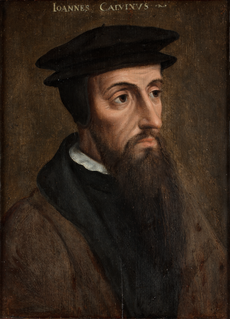Related Research Articles

The Presbyterian Church in America (PCA) is the second-largest Presbyterian church body, behind the Presbyterian Church (USA), and the largest conservative Calvinist denomination in the United States. The PCA is Calvinist in theology and presbyterian in government. It is characterized by a blend of Calvinist practice and broad evangelicalism.

The Reformed Church in America (RCA) is a mainline Calvinist denomination in the United States and Canada. It has about 194,064 members. From its beginning in 1628 until 1819, it was the North American branch of the Dutch Reformed Church.

The United Church of Christ (UCC) is a mainline Protestant Christian denomination based in the United States, with historical and confessional roots in the Congregational, Calvinist, Lutheran, and Anabaptist traditions, and with approximately 4,852 churches and 802,356 members. The United Church of Christ is a historical continuation of the General Council of Congregational Christian churches founded under the influence of New England Pilgrims and Puritans. Moreover, it also subsumed the third largest Calvinist group in the country, the German Reformed. The Evangelical and Reformed Church and the General Council of the Congregational Christian Churches united in 1957 to form the UCC. These two denominations, which were themselves the result of earlier unions, had their roots in Congregational, Lutheran, Evangelical, and Reformed denominations. At the end of 2014, the UCC's 5,116 congregations claimed 979,239 members, primarily in the U.S. In 2015, Pew Research estimated that 0.4 percent, or 1 million adult adherents, of the U.S. population self-identify with the United Church of Christ.

The Christian Reformed Church in North America is a Protestant Christian denomination in the United States and Canada. Having roots in the Dutch Reformed Church of the Netherlands, the Christian Reformed Church was founded by Dutch immigrants in 1857 and is theologically Calvinist.

Greenville Presbyterian Theological Seminary is a confessional Presbyterian seminary in Taylors, South Carolina, United States. Founded in 1986, Greenville Presbyterian Theological Seminary exists to equip preachers, pastors, and churchmen for Christ's Kingdom. The school is modeled on Old Princeton Theological Seminary of the late 19th and early 20th centuries. It teaches the accuracy and doctrinal integrity of the Westminster Confession of Faith, together with the Larger and Shorter Catechisms, as adopted by the Presbyterian Church in America. It is not affiliated with a specific denomination, but graduates of the Seminary minister in denominations such as the Presbyterian Church in America (PCA), Orthodox Presbyterian Church (OPC). Associate Reformed Presbyterian Church (ARP), United Reformed Churches in North America (URCNA), Reformed Church in the United States (RCUS), Reformed Presbyterian Church, Free Church of Scotland, Evangelical Presbyterian Church in England and Wales (EPCEW), Reformed Presbyterian Church of North America (RPCNA), Iglesia Presbiteriana de Brasil, Association of Reformed Baptist Churches of America (ARBCA), Reformed Baptist Network (RBN), Communion of Reformed Evangelical Churches (CREC), Bible Presbyterian Church (BPC), Presbyterian Reformed Church (PRC), and in a number of Independent congregations. The current president of the seminary is Jonathan Master, formerly the Dean of the School of Divinity at Cairn University.
The Orthodox Presbyterian Church (OPC) is a confessional Presbyterian denomination located primarily in the northern United States. It was founded by conservative members of the Presbyterian Church in the United States of America (PCUSA) who strongly objected to the Modernist theology during the 1930s. It has had an influence on evangelicalism far beyond its size.

The Associate Reformed Presbyterian Church (ARPC), as it exists today, is the historical descendant of the Synod of the South, a Synod of the Associate Reformed Church. The original Associate Reformed Church resulted from a merger of the Associate Presbytery and most of the Reformed Presbytery in Philadelphia in 1782. The northern Synods eventually merged with the forebearers of the Presbyterian Church (USA). It is one of the oldest of the United States' theologically and socially conservative denominations.

The Evangelical Presbyterian Church (EPC) is an American church body holding to presbyterian governance and Reformed theology. It is most distinctive for its approach to the way it balances certain liberties across congregations on "non-essential" doctrines, such as egalitarianism in marriage or the ordination of women, alongside an affirmation of core "essential" doctrinal standards.

The American Lutheran Church (TALC) was a Christian Protestant denomination in the United States and Canada that existed from 1960 to 1987. Its headquarters were in Minneapolis, Minnesota. Upon its formation in 1960, The ALC designated Augsburg Publishing House, also located in Minneapolis, as the church publisher. The Lutheran Standard was the official magazine of The ALC.
Mercersburg Theology was a German-American theological movement that began in the mid-19th century. It draws its name from Mercersburg, Pennsylvania, home of Marshall College from 1836 until its merger with Franklin College in 1853, and also home to the seminary of the Reformed Church in the United States (RCUS) from 1837 until its relocation to Lancaster in 1871.

The Reformed Church in the United States (RCUS) is a Protestant denomination Christian denomination in the United States. The present RCUS is a conservative, Calvinist denomination. It affirms the principles of the Reformation: Sola scriptura, Solus Christus, Sola gratia, Sola fide, and Soli Deo gloria. The RCUS has membership concentrated in South Dakota, Colorado, and California.

The Bible Presbyterian Church is an American Protestant denomination in the Calvinist tradition.
The Evangelical and Reformed Church (E&R) was a Protestant Christian denomination in the United States. It was formed in 1934 by the merger of the Reformed Church in the United States (RCUS) with the Evangelical Synod of North America (ESNA). A minority within the RCUS remained out of the merger in order to continue the name Reformed Church in the United States. In 1957, the Evangelical and Reformed Church merged with the majority of the Congregational Christian Churches (CC) to form the United Church of Christ (UCC).

The Protestant Reformed Churches in America is a Protestant denomination of 33 churches and over 8,000 members.
The Evangelical Synod of North America, before 1927 German Evangelical Synod of North America, in German (Deutsche) Evangelische Synode von Nord-Amerika, was a Protestant Christian denomination in the United States existing from the mid-19th century until its 1934 merger with the Reformed Church in the United States to form the Evangelical and Reformed Church. This church merged with the Congregational Christian Churches denomination in 1957 to create the United Church of Christ.
The Reformed Presbyterian Church, Evangelical Synod was a Reformed and Presbyterian denomination in the United States and Canada between 1965 and 1982.
The Presbyterian Church of the Philippines (PCP), officially The General Assembly of the Presbyterian Church of the Philippines, is a growing evangelical, Bible-based Reformed church in the Philippines. It was officially founded in 1987 and the General Assembly was organized in September 1996.
The Reformed Presbyterian Church in Taiwan was officially established in 1971 when the First Presbytery was formed as a result of the union of various conservative Presbyterian and Continental Reformed congregations which were built by the missions. Its origin could be traced back to the 1950s when the very first missionaries of these missions arrived Taiwan.
The Calvin Synod is an acting conference of the United Church of Christ, composed entirely of Reformed, or Calvinist congregations of Hungarian descent. Unlike much of the UCC, the Synod is strongly conservative on doctrinal and social matters, and many members of the "Faithful and Welcoming Movement," a renewal group acting to move the UCC in a more orthodox direction, belong to this body.

Presbyterianism has had a presence in the United States since colonial times and has exerted an important influence over broader American religion and culture.
References
- ↑ Hoeflinger, N and Stuebbe, R: "The History of the Eureka Classis: Reformed Church in the United States." Reliance Publishing Co. 1986, pg.25.
- ↑ Hoeflinger, N and Stuebbe, R: "The History of the Eureka Classis: Reformed Church in the United States." Reliance Publishing Co. 1986, pg. 49
- ↑ Hoeflinger, N and Stuebbe, R: "The History of the Eureka Classis: Reformed Church in the United States." Reliance Publishing Co. 1986, pgs. 81-130